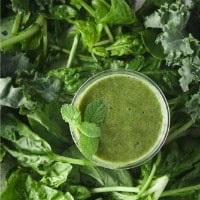Previously, studies report that vitamin K, lutein, folate and beta carotene are nutrients that may slow cognitive decline typical of aging. Martha Clare Morris, from Rush University Medical Center (Illinois, USA), and colleagues studied 954 participants in the Memory and Aging Project, average age 81 years, who reported their daily food and beverage intake by a standard questionnaire. The researchers computed the total daily nutrients by combining the nutrient content for each food consumed with the number of servings eaten each day. Subjects were followed for up to 10 years, during which they were assessed for changes in cognitive skills. After adjusting for confounding factors, the team found that those subjects who consumed greater amounts of green leafy vegetables experienced a reduced decrease in the rate of cognitive decline, as compared to those who consumed little or no leafy greens. People who ate one to two servings per day had the cognitive ability of a person 11 years younger than those who consumed none. The team then ascertained that green leafy vegetables are abundant in vitamin K, lutein, folate and beta-carotene.
Leafy Greens Support Memory & Thinking
M.C. Morris, S.L. Booth, B. Dawson-Hughes, L.L. Barnes, D.A. Bennett, Y. Wang. “Relations to Cognitive Change with Age of Micronutrients Found in Green Leafy Vegetables” [Abstract 260.3]. Presentation at Experimental Biology 2015 (American Society for Nutrition), 30 March 2015.
RELATED ARTICLES




